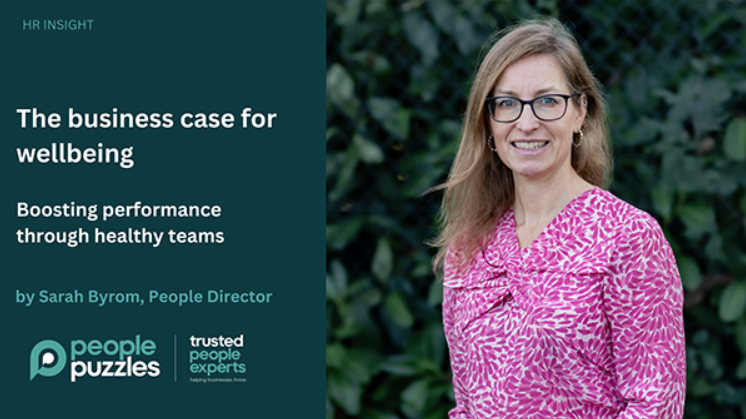Imagine leading a business where your team loves what they do, thrives in their roles, and consistently delivers outstanding results. Managing healthy teams sounds ideal, doesn’t it? People Director Sarah Byrom explains how to get your team on board with your values and purpose.
For small and medium-sized businesses, achieving this starts with creating an environment where people feel valued, aligned with your purpose, and empowered to work in a way that supports both their personal and professional wellbeing. As we move into a new year, here are three resolutions to focus on: values, purpose, and healthy working practices.
Values
Every great business starts with great people. To build a thriving organisation, you need to hire individuals who not only excel at their jobs but also share your company’s values. This means going beyond technical skills and asking the right questions during interviews to assess whether candidates align with your culture. For instance, if your company values teamwork and collaboration then ask a candidate to share an example of how they worked with others to achieve a shared goal? Ask what role they played, and what was the outcome? Their answer will give you a sense of their ability to incorporate those values into their decision making and behaviour.
But it doesn’t stop at hiring. A values-led approach ensures that your team works cohesively, enjoys coming to work, and feels a sense of belonging. When people feel connected to their colleagues and the organisation’s ethos, they’re more likely to deliver their best. Encourage this by communicating openly and recognising achievements that align with your values. Make it a goal to prioritise not just hiring for skills but for shared values and vision. That way, people are more likely to stay for the long term and feel more connected with the business and its mission; that sense of investment will translate as accountability and longevity, building healthy teams, driving performance, and employee retention.
This approach starts with establishing meaningful values, something I have refined through years of experience working with clients to define and implement their core values. I run workshops with the entire team to ensure that everyone has a voice. For larger teams, typically those with more than 30 people, I use surveys to gather input from all members. This process not only helps ensure the values are authentic, inclusive and resonate with the whole team but also leads to a sense of ownership and belonging. By involving everyone from the start, I’ve seen how collaboratively defined values create a strong foundation for a unified organisational culture.
Purpose
Having a clear purpose is the glue that unites healthy teams. It gives your people a reason to feel connected to the work they do and motivated to achieve common goals. Take time to define your organisation’s purpose and ensure it aligns with your business agenda. When it comes to developing purpose, I focus on uncovering and sharing the stories behind a company’s mission and vision—often drawn from founders, CEOs, or COOs. These stories are powerful tools for making the purpose tangible and relatable.
Purpose is also about allowing individuals to thrive. Every employee should feel empowered to work in a way that plays to their strengths and passions. Some of your team members might be at their most creative in the office, while others problem-solve better in a quiet home environment. Build trust by having honest conversations about what helps your people perform at their best. By embracing flexibility and focusing on outcomes rather than hours spent at a desk, you’ll build a team that is driven and happy to work towards your shared goals.
Share your purpose widely and make it a central part of your company’s culture—whether through regular communication, team meetings, or shared objectives.
To reinforce both purpose and values, I run bite-sized “lunch and learn” sessions with teams, diving into each of the company’s values to explore what they mean in practice and how individuals can contribute to them. Some organisations also implement peer recognition schemes based on their values, which I’ve seen work effectively to bring the values to life. The key is to ensure that values and purpose are embedded in the culture and decision-making processes, not just left to gather dust in a forgotten document.
Healthy teams means healthy working practices
The foundation of any productive team is their wellbeing. Healthy working practices ensure your people have the energy, focus, and enthusiasm to do their best work.
Start by setting clear boundaries around work hours and encouraging regular breaks. Taking an hour at lunch will make people sharper and more productive in the afternoon. It is important that your people are able to ‘down tools’ and step away at the end of the day. This requires both discipline and role models to set standards of behaviour. Leaders play a vital role here, as your team will take their cues from you. Whether it’s stepping away from your desk for lunch, turning off emails after hours, or openly prioritising family time, you set the tone for a balanced culture.
Simple initiatives can make a big difference. Create spaces where people can connect; one of my clients has a kitchen where everyone takes lunch together, which builds friendships and community as well as giving their people a proper break. Personally, I enjoy a walking meeting or taking people away from the office to set strategies, problem solve and spark new ideas.
If your team works remotely, invest in opportunities to meet in person occasionally. Building a sense of community doesn’t just make work more enjoyable; it improves collaboration and strengthens your organisation.
A New Year, a new approach
As you plan for a new year, make it your resolution to focus on the principles of values, purpose, and healthy working practices. When your people feel valued, united by purpose, and supported in their wellbeing, they’ll do their best work.



